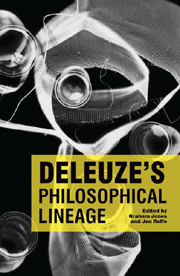Book contents
- Frontmatter
- Contents
- Acknowledgements
- List of Abbreviations
- Introduction: Into the Labyrinth
- 1 Plato
- 2 John Duns Scotus
- 3 G. W. F. Leibniz
- 4 David Hume
- 5 Immanuel Kant
- 6 Solomon Maimon
- 7 G. W. F. Hegel
- 8 Karl Marx
- 9 Hoëne Wronski and Francis Warrain
- 10 Bernhard Riemann
- 11 Gabriel Tarde
- 12 Sigmund Freud
- 13 Henri Bergson
- 14 Edmund Husserl
- 15 A. N. Whitehead
- 16 Raymond Ruyer
- 17 Martin Heidegger
- 18 Pierre Klossowski
- 19 Albert Lautman
- 20 Gilbert Simondon
- Bibliography
- Notes on Contributors
- Index
16 - Raymond Ruyer
Published online by Cambridge University Press: 12 September 2012
- Frontmatter
- Contents
- Acknowledgements
- List of Abbreviations
- Introduction: Into the Labyrinth
- 1 Plato
- 2 John Duns Scotus
- 3 G. W. F. Leibniz
- 4 David Hume
- 5 Immanuel Kant
- 6 Solomon Maimon
- 7 G. W. F. Hegel
- 8 Karl Marx
- 9 Hoëne Wronski and Francis Warrain
- 10 Bernhard Riemann
- 11 Gabriel Tarde
- 12 Sigmund Freud
- 13 Henri Bergson
- 14 Edmund Husserl
- 15 A. N. Whitehead
- 16 Raymond Ruyer
- 17 Martin Heidegger
- 18 Pierre Klossowski
- 19 Albert Lautman
- 20 Gilbert Simondon
- Bibliography
- Notes on Contributors
- Index
Summary
To the casual observer Raymond Ruyer might seem a minor contributor to Deleuze's enterprise. Deleuze first mentions Ruyer in Difference and Repetition (1969), quoting him briefly and listing him in the annotated bibliography as a source for information about ‘biological differenciation’ (DR 342). Deleuze and Guattari make reference to Ruyer in Anti-Oedipus (1972), A Thousand Plateaus (1980) and What Is Philosophy? (1991), but without discussing his thought in any detail. Deleuze's most extended treatment of Ruyer appears in The Fold (1981), and though remarkably dense and concise, it nevertheless occupies only two or three pages of the book. Yet, despite such evidence, one might well claim Ruyer as one of the most important influences on Deleuze's philosophy of biology, and a significant force in the development of Deleuze's ontology as a whole. If ‘the world is an egg’, as Deleuze asserts in Difference and Repetition (DR 251), it is through an examination of the thought of Ruyer and its appropriation by Deleuze that one may most easily grasp the full implications of this assertion.
Born in 1902, Raymond Ruyer began his studies at the Ecole normale superieure in 1921, completing his docteur ès lettres in 1930. For most of his career, he taught at the Université de Nancy. Ruyer's doctoral thesis appeared in two volumes in 1930, L'humanité de l'avenir d'après Cournot, a study of the philosophy of Antoine- Augustin Cournot (1801–87), and Esquisse d'une philosophie de la structure, in which Ruyer developed Cournot's insight into the centrality of structure as the guiding light in all objective cognitive investigation.
- Type
- Chapter
- Information
- Deleuze's Philosophical Lineage , pp. 300 - 320Publisher: Edinburgh University PressPrint publication year: 2009



